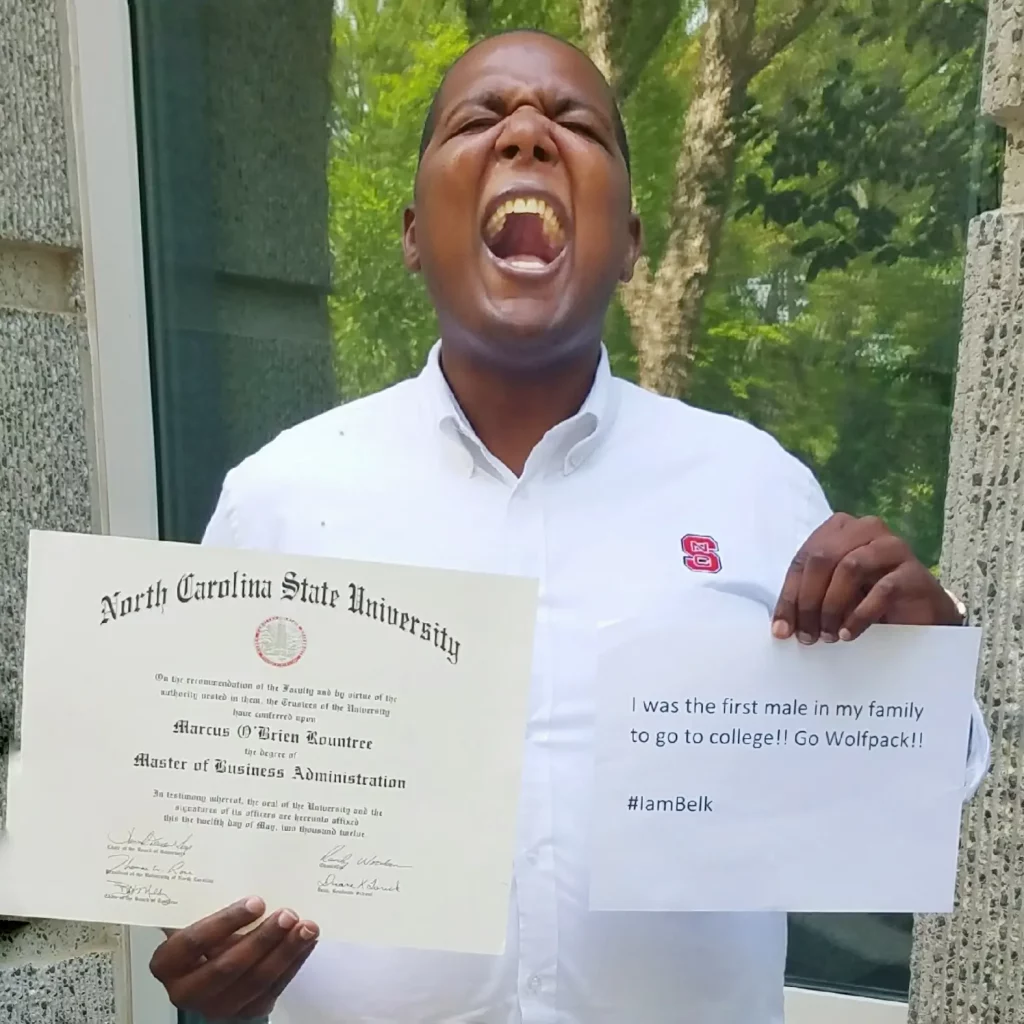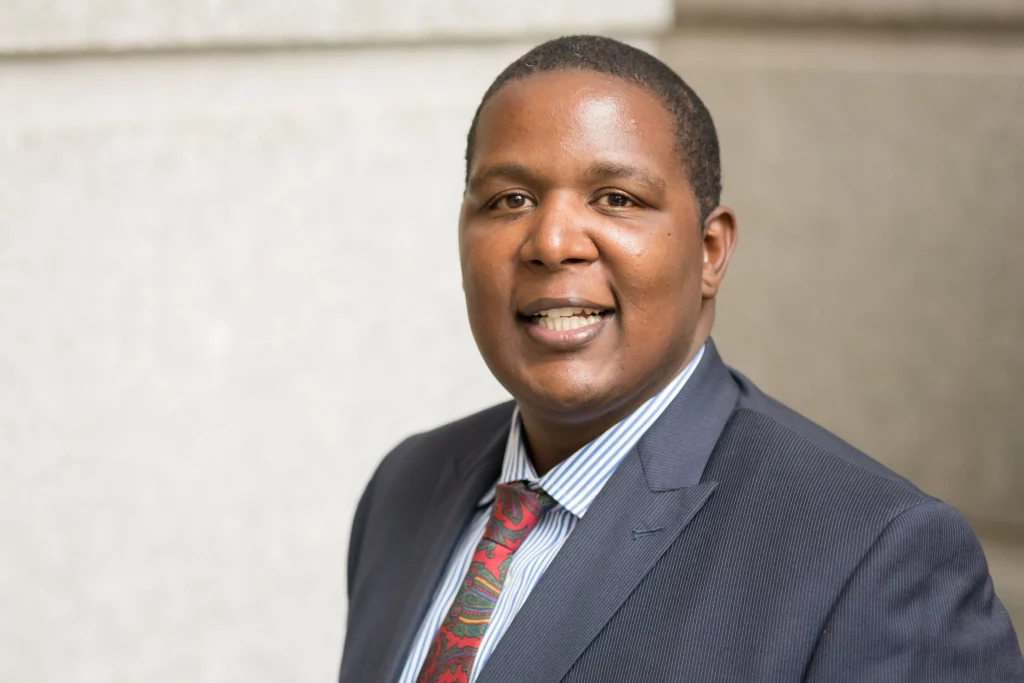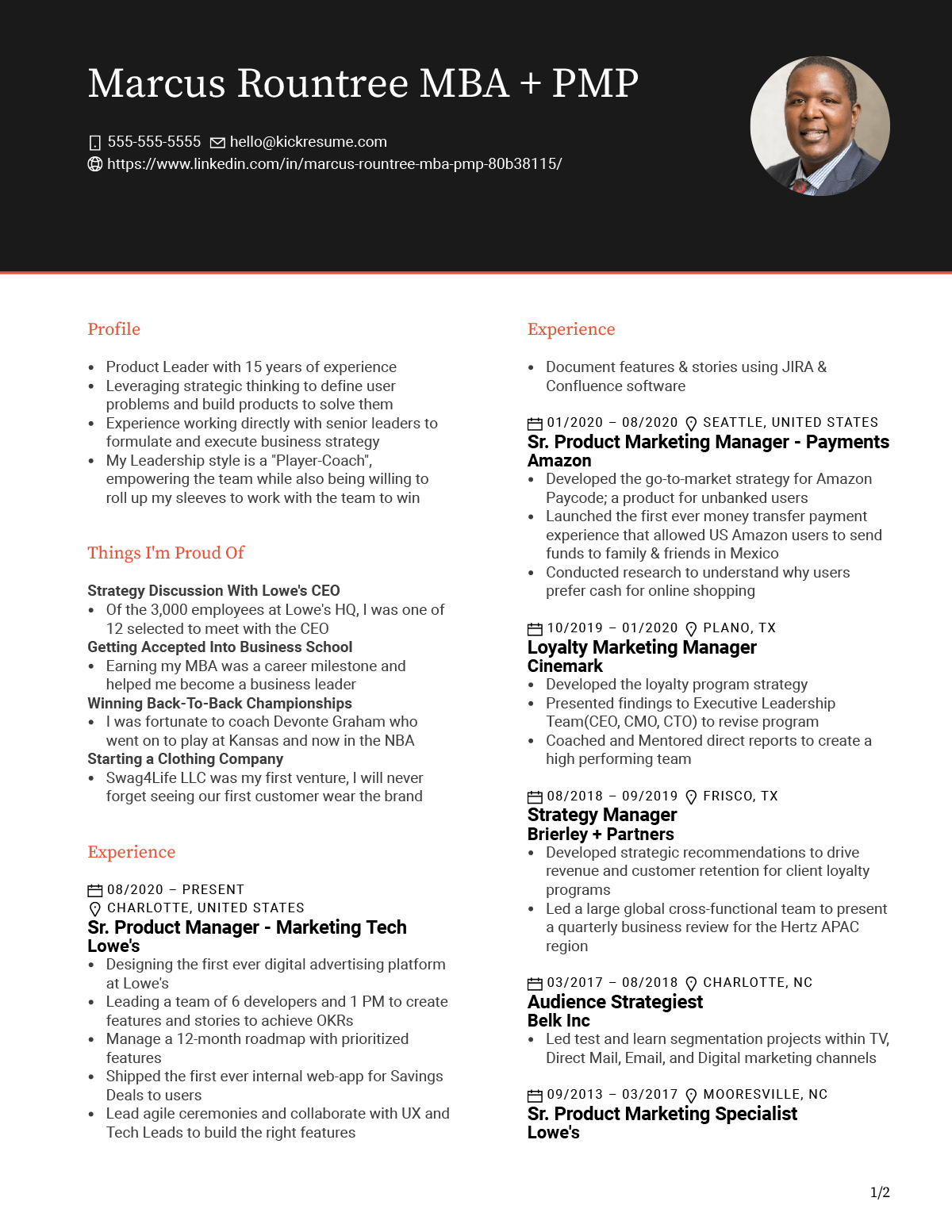Did you ever find yourself thinking that the career path you chose might not be for you anymore?
Marcus did too. And not only once.
He has changed careers four times in the past decade — he went from being a science teacher and basketball coach to entrepreneur, marketing professional, strategist, and finally to product leader at Lowe's.
At first, it might sound daunting. But all his career pivots had something in common. In the end they got him where he's today.
During this journey, he was recruited by and interviewed with Amazon, Lowe's, Facebook, Disney+, and Lyft.
Even though changing the course can feel overwhelming, it can be done. If you're considering a career change for whatever reasons, Marcus has some great tips for you!
Marcus will tell you:
- When is the right time to change your career;
- How long it took him to get to his current role;
- What he does as a Product Leader at Lowe's;
- What were the main challenges during his career pivots;
- How Amazon's recruiter approached him on LinkedIn;
- That a skydiving video link on a resume got him a job;
- His secret tip on how to replace a cover letter;
- What career change interview questions to prepare for;
- How to negotiate a salary (even as a career switcher);
- And more.
I've listened to a podcast where you said that in 2009 you were laid off as a teacher due to the recession and that it was also an underpaid job. Was that the trigger for you to change careers?
It definitely was. I love teaching and if the Great Recession didn't happen, I'd probably still be in teaching and maybe even become a principal. But I've always wanted to be an entrepreneur, so it was the right time to try a career pivot. Getting an MBA with a marketing concentration changed everything for me. I'm a big believer in getting a degree, especially if you're a career switcher. The MBA opened the door for me back then and it continues to do so.
Was it difficult to get into business?
It was. It required lots of studying and I was also so young at the time. I was twenty-five years old and most MBAs are twenty-eight to thirty-two. I didn't have a lot of experience, but I was able to show my strengths and what makes me unique. I leaned into those things and had a great interview with the admissions office and was fortunate to get in.
During your studies, you started to your own company, correct?
Yes, I did. Swag4Life Clothing was my first ever venture. The idea came when I wanted to get some university branded clothing so everyone knows that I'm attending NC State. :D But I didn't see anything that appealed to me. So, I thought, why don't I create a brand that takes the university brand equity, and then add some graffiti and hip-hop flavor? I got a contract with NC State to use their trademark and then hired some great designers to help bring my vision to life. We brought it to market, I pitched it to an investor and got an initial investment of $50,000.
That's impressive for a first-year student!
Actually, everything I learned in business school during the day, I was applying to my start-up at night. It was an amazing experience. I'll never forget when our clothing was officially on sale and I saw students wearing it.

Why did you decide to abandon your company after school?
That's a great question. We ran out of money. :D So, I needed to get a real job. But it was also because I was transitioning into retail and it was a challenge for me to continue building my own company while I'm in the retail industry. I've decided to focus more on how I can continue to grow in corporate retail in terms of strategy. But those things I learned as an entrepreneur I always take with me. And a lot of companies value that too.
I've seen in your resume that after more than one year in sales, you decided to switch to marketing. Why?
When I took the sales job, I didn't feel like I was using my MBA. I was driving sales and revenue through customer service and experience, but I wanted to get deeper into the marketing strategy. And that's what really led me to marketing. Because of my passion for consumer behavior, as a marketer I was able to really understand what the customer wants, how we serve the right experiences and really got more into strategic thinking.
As a marketer, you also worked at Amazon. That's impressive! How did you get there?
With Kickresume! :D
Really? :D
Yes. :D At that time, I had a lot of experience in marketing and I wanted to reinvent myself. I started researching resume templates and found a resume of Marissa Mayer, a former CEO of Yahoo. I saw her template and it was so amazing! She talked about things she was proud of and it felt like you were reading a story about who she was, what was important to her, and how much she enjoyed being a mom.
And I wanted to position myself the same way. I started searching and found Kickresume. So, I sat down and started writing my resume. I wanted to write it the way that recruiters will enjoy reading it. I've put my picture on the front of my resume, I talked about things I'm proud of, I even added content like YouTube videos when I was public speaking or from my skydiving experience. I added hobbies and awards that I've gotten throughout the years. And I just really told my story.
Did you apply with that resume at Amazon?
Actually, not at first. I started interviewing for roles with some other companies. And I got great feedback from recruiters like "Marcus, as someone who reads resumes for living, I loved reading your resume". And during that time, I got a LinkedIn message from an Amazon recruiter saying "Hey, we like your profile. Would you be interested in moving to Seattle?" :D
What did you reply?
I was interested, so I sent them my resume. They liked my background and they scheduled a phone interview, then another phone interview and then I had a full interview with five people for five hours. I was so prepared and I knew it was THE moment. I knew it would change our family's life and I took it very seriously and applied a lot of the star method and all the different scenarios. Within one month, I had an offer to join Amazon with full relocation. It was amazing how it all occurred. But I felt like that resume really told my story and I do believe it opened that door for me.
I agree, because they could see who you are as a person, not only as a professional. That can make a huge difference.
Exactly. It helped them understand how I'd culturally fit in. I knew I had the right story to tell and then when the big opportunity came, I was ready with the right template. And it really changed the game for me.
That's cool! And how was your time at Amazon?
It was incredible. I learned so much about how to scale things across different countries, how to be scrappy as an entrepreneur and as a marketing leader. But as I mentioned before, I was becoming the marketing guy but I had other skills that I wanted to bring to the table. So, I started interacting with product managers, asking them what they do. They said “Today, I'm doing market research and I'm talking to users. I'm also doing an AB test to see if this button should be red or blue. The next day I work with my engineers". I saw them doing cool things, launching new technologies. I was so amazed by their job, I said to myself that my next move is going to be into product management. I could take my domain knowledge, marketing, strategy and the ability to collaborate and lead without a direct authority.
You're now at Lowe's, but didn't you think about doing product management at Amazon?
I did think about it. But I think I was so laser-focused on just doing marketing there, that I didn't see it as an opportunity. At the same time, it's challenging to get into product management if you don't have the traditional computer science background. But I was fortunate to find an opportunity where I'm building products for marketing users. So, it was easier to transition as I could bring my domain expertise.
Actually, you had worked at Lowe's before. Was it easier to get into the company again?
It was because I had already demonstrated that I was a cultural fit. But honestly, I didn't want to leave Lowe's even in the first place. I always had a great experience, but I felt like I needed to keep advancing my career and adding more skills. So, when I had the opportunity to come back, I was like "I'm coming home", just with new skills and experiences.
Since you previously worked in marketing and this new position was also related to marketing, you probably didn't have to start in a junior position, right?
I didn't. I was very fortunate that the role needed someone with strong marketing expertise. And my previous experience at Lowe's was also on the marketing team where I was using the marketing tools to see how we can make it better. So, I had a deep knowledge of the user, knew the culture and it was the skill set that was needed on the team. That combination allowed me to transition to a higher role.
That's great because often, career switchers have to start from the bottom, also pay-wise. So, it's easier if you can find something which is similar to your previous field.
Yes, that's very important. You need to find out whether it's the right fit in terms of your skills, experience, your passion and the culture. Those things have to be in place to make sure that you're set up for success.
Did you do any training or courses before you applied for a job in a new field? Or did you do it once you were already in the role?
A combination of both. When I was at Amazon and I already knew that product management is the next step for me, I was trying to interact with PMs and engineers to learn more about product management. I was also researching what a product manager does, reading books from Marty Cagan, an incredible author of two books about product management, Inspired and Empowered. Then during my first year in product management, I consumed so much content. I've read lots of blogs, attended webinars, listened to podcasts and audiobooks.

How long did it take you to adapt to the new role?
I'd say it took around eight months. After that time, I felt like I was playing the game, I wasn't thinking as much whether I should pass the ball or shoot it. I understood the players and what we were trying to accomplish. But I'm still learning every day.
And what exactly are you currently doing as a product leader at Lowe's?
Simply put, my job is to solve problems for our users, that is also going to drive a positive outcome for our business. I focus on building marketing platforms that make life easier for internal marketing teams who are our customers at Lowe's. I'm working with developers and other product managers, identifying problems, what our objectives are, and how we launch new features that are going to truly make an impact and solve problems. And that's probably the most exciting thing about being a product manager — that you're solving problems.
Did you realize that you had many transferable skills from previous jobs that you could use in your current role?
Absolutely, even from my teaching experience. Communication and being able to take a complex problem and communicate in a way that anybody can understand is super important. Another skill is cross-functional leadership and being able to influence people that don't technically report to you. Also, I could understand the customer better because I've already been in the industry.
That sounds great. But still, wasn't it a bit scary to change careers for the fourth time? I mean, many people are afraid to do it even the first time.
I think I've made a lot of pivots :D And yes, it was scary making another move. But ultimately, I feel like all my pivots skyrocketed my career. For me, it was important to know when is the right time to make a pivot.
How did you know when was the right time?
After I've felt I acquired a bunch of skills and experience, I asked myself: “Am I continuing to grow? Am I being challenged?” Whenever I felt like those things weren't in place, I first thought about whether there's another certificate that I can get. That's one way you can continue to grow before you decide to make a pivot. But if you feel like it's time to make a pivot, then you’re probably right. However, my latest move was also about coming home to North Carolina. That's where I'm originally from and where Lowe's headquarters are.
I've read on your LinkedIn that your pivot to product management was the most challenging for you. Why?
Before, I was in the marketing space where we wanted to drive traffic, get folks to shop online, or adopt a new payment method. And I switched to building a product that will solve someone's problem. I needed to shift from a marketing mindset and laser focus on the user. So, I think it was mainly about the fundamentals.
Sometimes when you're changing careers, you may have colleagues who are younger than you but have more experience in the field. Wasn't this a challenge too?
There have been experiences where I've had other product managers that have been in the space longer. But I don't see it as a bad thing. Actually, one of the things that I've done since I've jumped into product management is reach out to other product managers and talk with them about solving different problems, different frameworks, or what blogs they're reading. I see it as an opportunity to learn from them.
Are there any other challenges that you had to face during your career pivots?
Earlier in my career, it was hard for me to transition from being viewed as a teacher versus a business leader. I sent my resume and they were saying "Hey, we know you have it but it's hard for us to not think of you as a teacher." So, in my resume, I started to downplay the fact that I was a teacher and rather focused on transferable skills that I got from teaching. I even changed the placement of my teaching on my resume. It used to be at the top, I put it in the middle and then put more relevant things at the top. It was this small change but thankfully I got interviews and was viewed differently.
Wow, that's harsh. What other changes did you make to your resume, apart from this?
When I went to apply for my first big job, I put a link to my skydiving video on my resume. And it's actually why I got hired. :D The VP of marketing told me that when she saw my passion and energy in the video, she knew that she wanted to work with that guy. So, I always tell people to put some unique content on their resume. You never know who will view it and how it will shape your story. And to this day, I still have that video on my resume.
That's so cool! People often don't include such things on their resumes because it's normally not advised to include them. But when done right, it can help you set yourself apart from others.
Yes, and ultimately, people want to work with people that they like or feel like they'd be a good cultural fit. You need to include something that will tell the recruiter "Hey, this is why I'm different and this is what I'm passionate about".

Did you also send a cover letter? Or just a resume?
A lot of people talk about cover letters, but instead of sending one, I send my personality assessment results. Basically, it's an assessment where you answer a bunch of questions and then it spits out your top five personal traits, like being strategic, achiever and so on. And I've got great feedback from recruiters, so I would encourage people to do that. It paints the full picture together with your resume.
Haha, I like the idea! Did you attach it as a PDF?
Yes. Even when jobs require a cover letter, I upload this assessment instead.
And do companies still get back to you? Because there are some companies that don't like it when job candidates don't follow instructions. On the other hand, I'd be impressed as a recruiter.
I only got good feedback from recruiters saying they appreciate that I've added the assessment. But yes, it's a little tricky. And everyone needs to decide whether they want to do it or not. But I had a good experience with it.
Do you have any other advice for job seekers? Especially those who want to change careers?
First, don't disqualify yourself as a job candidate if you don't check all the boxes in the job description. Especially if you're a career switcher. Instead, focus on what you do have and still apply. And make sure that you tell your story with your resume.
Second, LinkedIn is a great place to get a job. Use a feature called open to work. If you add that to your profile, you can list the jobs that you're interested in, or where you want to work. And only companies and recruiters can see it. I get a lot of job opportunities just because of that feature. And I do believe that was one of the factors that got me the Amazon job.
Finally, make sure that you stay positive. It's a process and it can be frustrating. Just continue to submit those applications with your best resume.
And what about career switch job interviews? Are they a bit different in comparison to regular job interviews?
I think that apart from my product management interview, all other interviews were more behavioral-based. Like "Tell me about the time you've managed a conflict. Tell me about a time when you had to make a decision." Using the star method — situation, task, action, and result — is always the best way to go when answering them. On the product management side, these interviews are very different. More focused on the product, how to design a product, how to identify users and use cases.
Did they also ask you questions about your motivations when it comes to career change?
Yes, that's very common. Things like "Why do you want this job? Why do you want to switch careers?" You want to make sure that you're presenting yourself as not running from an opportunity, but running towards something that's going to help you to grow. You can say that you had great experience and that you want to go to the next level and you can see what the company is doing in terms of their business model, growth, leadership, and so on. And how you can help them achieve it in that specific role.
What about salary negotiation? In the podcast you said that you weren't really negotiating a salary before. Isn't it a common issue for career switchers? Many are probably happy they even got the job.
You're right, I think I started negotiating probably around 2019 which was in the middle of my career. And just like you said, when I got my first role from sales to marketing, I just wanted a job. I didn't even think about negotiating because it's not something that is really taught in school. But always try to negotiate. Always. Even if you're transitioning. Because it's what the market pays for that specific role.
That's a very good point because I think this is also an issue for many fresh graduates that they don't even think about negotiating a salary. And later, it's harder to get where they want to be wage-wise.
Yes, exactly. Actually, I've started building my own Coach Rountree brand, where I talk about these things frequently. I share interview tips to help others and I also created an email counter-offer template that people can use. So, when I receive the offer, I'll go to Glassdoor or Indeed. I'd check the range and I'd follow up with an email saying "Hey, thank you so much for this opportunity, based on conversations with my family, I'd like to move forward negotiating. Here's my salary expectation.” And then I'd close the email by saying I'm so eager to start adding value to the company. Actually, someone on Twitter reposted this template, she tagged me and said she used it and it worked! :D
So, I encourage people to go to Glassdoor and Indeed, find out what that role pays and then think about what you're currently making. Then always ask for at least ten to twenty percent more.
It seems like you're going back to your teaching roots! Now that you're teaching people how to get jobs.
Yes, I miss teaching and coaching. And Coach Rountree is an outlet where I can create this content. And I remember that early in my career I didn't know these things. So, I just want to create a space where people can learn that.




